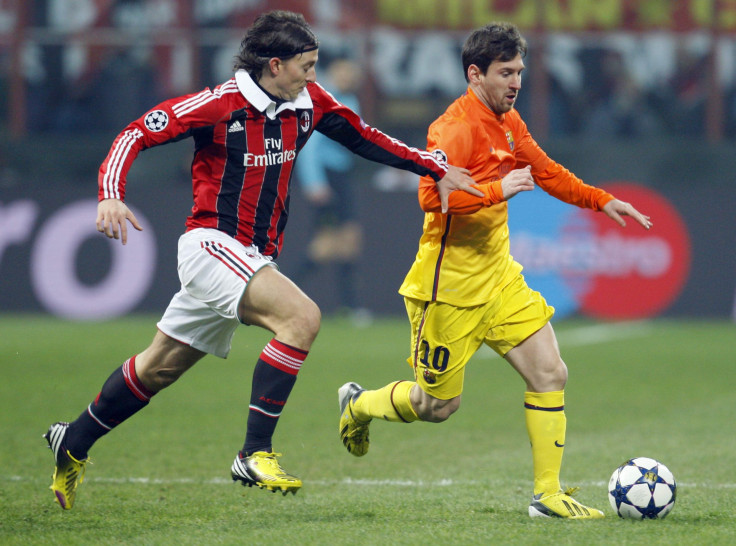Barcelona Vs. Milan: Prediction And Preview For Champions League Last-16 Second Leg

Barcelona face the challenge of doing something that has only been managed four times in the history of the Champions League against Milan on Tuesday, coming back from a first-leg deficit of two goals or more.
Few will have expected Barcelona, the then favorites for the competition, to be in this position when the draw was made for the round of 16. Yet, Milan produced a near perfect display at the San Siro three weeks ago to nullify Barcelona’s attacking threat and strike with consistent menace on the break and grab a 2-0 victory.
Following the stunning loss, Barcelona endured further heavy blows as they suffered consecutive defeats to Real Madrid that saw them exit the Copa del Rey and then their lead reduced in La Liga. For Barcelona, it was not just the defeats that will have been concerning but the manner of them.
In all three high-profile games, the Blaugrana could have no complaints about the final outcome.
Until the clash in Milan, Barcelona’s season had appeared to be sailing along, with a reclaiming of the Liga title all but secured. But their results belied an increasing drop in the level of their performances. Going into the first leg, Barcelona had already gone nine matches without keeping a clean sheet—it would become 12—a statistic that reflected a lack of focus throughout the team.
As soon as they came up against opposition with the capabilities to exploit their dip in standards then Barcelona were sternly punished.
What was also blindingly evident against Milan and subsequently Madrid was problems on the offensive end. Right-back Dani Alves has succinctly described the issues perfectly ahead of the return match with Milan.
“We play to a different tempo to everyone else," he explained, according to UEFA’s website. "When we hit it we're really great, but when we don't we're a normal team. It depends on us.”
Of late, Barcelona’s tempo has been sorely lacking. Their often exhilarating, incisive passing and movement is capable of pulling even the best organized defenses out of shape to create what appear simple openings.
Recently, though, Barcelona’s passing has appeared laborious, like a half-paced training session played after a heavy night out.
Several factors can be attributed to this.
While some will point to a similar ineffectualness in last season’s Champions League semifinal defeat to Chelsea, it is premature to talk of a permanent decline.
What cannot be ignored is the absence of coach Tito Vilanova. It is hard to imagine any squad being able to maintain a high level having lost effectively their second coach in the space of a few months—following the departure of Pep Guardiola last summer.
There is no reason to doubt the capabilities of Jordi Roura, but the absence of Vilanova in and around the training ground, not to mention on the sidelines on match days—while he continues to receive treatment for cancer in New York—must be significant.
There are more nuanced problems as well. Both Barcelona and Lionel Messi have been willing over recent seasons to put increasing emphasis on the phenomenal forward, and understandably so. But the team and Messi now appears to be struggling due a lack of threat around him.
Pedro, so impressive for Spain this season, has not replicated his international form for Barcelona, particularly of late. Also in attack, David Villa has struggled for opportunities and, despite a generally good scoring record, did not do his chances of getting the nod against Milan any good with some profligate finishing against Deportivo La Coruna at the weekend.
In beating Depor 2-0, a much-changed Barcelona side were again far from their best, but there were some encouraging signs. Most obviously, the Catalans finally kept a clean sheet, although with the large caveat that it came against La Liga’s bottom side who were shorn of their top scorer—Riki.
There were also moments, though, when some of that upbeat temp returned to their passing in the final third. Lionel Messi produced his best moment in recent weeks with a stirring run and one-two with Alexis Sanchez before finishing for a delightful second goal.
The performance of Sanchez could be a huge boost for Barcelona. The Chilean has been desperately short of form this season, but in scoring one goal and creating another on Saturday his worryingly low confidence should be boosted.
With his direct running, ability to get in behind and the width he can offer, Sanchez could be crucial against Milan.
The Rossoneri looked excellent in the first leg, but their full-backs are average at best and it is an area, with their own full-backs pushing on, that Barcelona must target. The center of Milan’s defense too can be vulnerable. Put Philippe Mexes, in particular, under real pressure and he has shown a capacity to crack.
Alves, again, perfectly described the scenario.
“We have spectacular players and the Camp Nou could be a long night for Milan,” he said. “If we hit our tempo in the match we've a great chance of going through but if we play at half-pace, then we're out."
Milan, though, on an unbeaten run of 10 games, are likely to be full of confidence of securing a memorable upset. Barcelona may, as Alves says, hit their tempo and give Milan ample problems at the back. But it is difficult to see them keeping Milan out at the other end—with the pace and ability of Stephan El Shaaarawy, Kevin Prince-Boateng and M’Baye Niang being supplied by Riccardo Montolivio.
An away goal would leave Barcelona needing to score four and that may prove just too high a hurdle to overcome.
Prediction: Barcelona 3-1 Milan
© Copyright IBTimes 2024. All rights reserved.





















